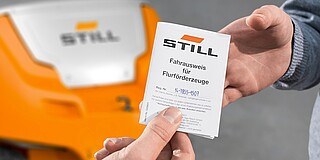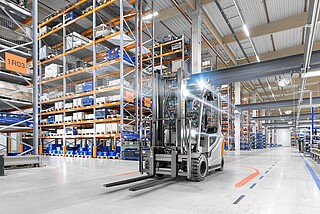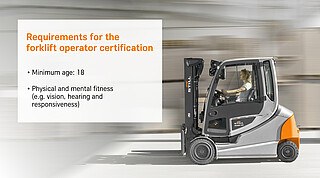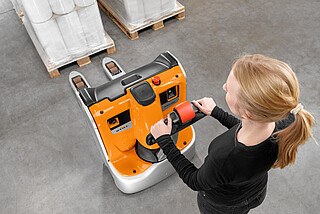Forklift operator certification: The most important information at a glance

Whether in logistics, production or warehousing, anyone who wants to operate a forklift truck must undergo the appropriate training. What legal regulations apply? What requirements must be met? And how much does it cost to obtain a forklift operator certification? Read on to find out.
Legal regulations and requirements
In Germany, a forklift operator certification (properly known as a certificate of competence for operating industrial trucks) is required by law for anyone working with motorised forklift trucks. This is mandated by the German statutory accident insurance DGUV (Deutsche Gesetzliche Unfallversicherung), specifically by DGUV Regulation 68 and DGUV Principle 308-001, which set out the training requirements for forklift operators. To obtain a certificate, individuals must be at least 18 years of age and physically and mentally fit for the job. This means having sufficient eyesight and hearing, for example. Quick reactions and the ability to recognise and correctly assess complex situations are also important. Suitability is typically verified by a company doctor or via a self-assessment form.
Unlike a driving licence for cars, a certification for operating a forklift is not an official document issued by the authorities, but is usually issued by certified training providers. Employers are obliged to only allow suitably qualified and trained individuals to operate forklift trucks.

What is the training process like, and how much does a forklift operator certification cost?
Forklift driving is taught in special training courses, which cover both theory and practice. The training is divided into several levels. For most operational requirements, ‘Forklift Operator Certification Level 1’ is sufficient. This covers driving forklift trucks on company premises. Those who wish to operate more complex equipment or have specialised applications often require 'Forklift Operator Certification Level 2'. The cost of a forklift operator certification varies depending on the provider, scope, and region, typically ranging from €100 to €300. Often, these costs are covered by the employer.

How long is the forklift operator certification valid for?
In principle, a forklift operator certification does not expire once obtained. However, employers must instruct their employees in the safe use of industrial trucks at least once a year. These instructions are intended to adapt to new operational conditions and refresh knowledge in general. They also cover legal changes and technical innovations. Anyone who changes their area of work within a company or changes employers must also undergo new training.
In addition to a forklift operator certification, a written transport order from the employer is mandatory for operating forklift trucks within the company. This document confirms that the employee has been assigned to operate industrial trucks and has received the necessary instructions. No forklift truck may be operated without this order, even if a valid forklift operator certification has been obtained.

Which regulations apply to pedestrian-operated vehicles?
Not all industrial trucks require a forklift operator certification. No special training is required for pedestrian-operated industrial trucks, i.e. trucks that are handled by an operator walking alongside them rather than riding on them. This includes electric or manual pallet trucks, where the operator walks alongside the truck and steers it using a tiller. This also includes pedestrian-operated equipment with fold-up driver platforms, provided they do not exceed a maximum speed of 6 km/h. However, while no formal training or certification is required, employers must still provide brief in-house training.
Who is allowed to drive a forklift truck on public roads?
Driving a forklift truck on public roads is subject to special regulations. If a forklift truck is to be driven outside of a company's premises, the driver must hold a valid driving licence of category L or higher (according to the German categorisation system) as well as a forklift operator certification. The vehicle must also be approved for road use and insured, and must be equipped with all the required safety features, such as lights and number plates. Use on public roads is only permitted if these additional regulations are complied with.

Get your forklift operator certification with STILL
Anyone wishing to learn how to drive a forklift truck should familiarise themselves with the legal requirements and training options in advance. A forklift operator certification is a legally required qualification that is essential for personal safety and smoothly running operations. Whether you are an individual or a company, investing in professional training will pay off in the long term by reducing accidents, ensuring legal compliance and making work processes more efficient.
As an experienced provider, STILL offers a comprehensive range of training courses to help you obtain your forklift truck operator certification. Our courses cover everything from basic training and refresher sessions to specialised seminars for different vehicle types. Our training courses are held throughout Germany and comply with all legal requirements. To find out more about driver training and how to register, please visit our website or contact your STILL representative directly.
Legal note:
The information provided in this article does not constitute legal advice. For information on legal requirements that is binding, please contact the relevant authorities or professional associations.
Contact request
Subscribe to the Newsletter !
Always up to date with STILL: Subscribe to the STILL newsletter and we will inform you regularly about interesting industry topics.
